Key takeaways:
- Urban telematics networks enhance urban mobility by providing real-time data on transportation options, promoting sustainability.
- Adopting a car-free lifestyle enriches urban experiences, fosters community connection, and significantly reduces traffic congestion and pollution.
- Reducing car dependence leads to financial savings, improved mental well-being, and positive environmental impacts.
- Exploring alternative transportation methods, like biking and public transport, creates a deeper appreciation for local neighborhoods and enhances daily routines.
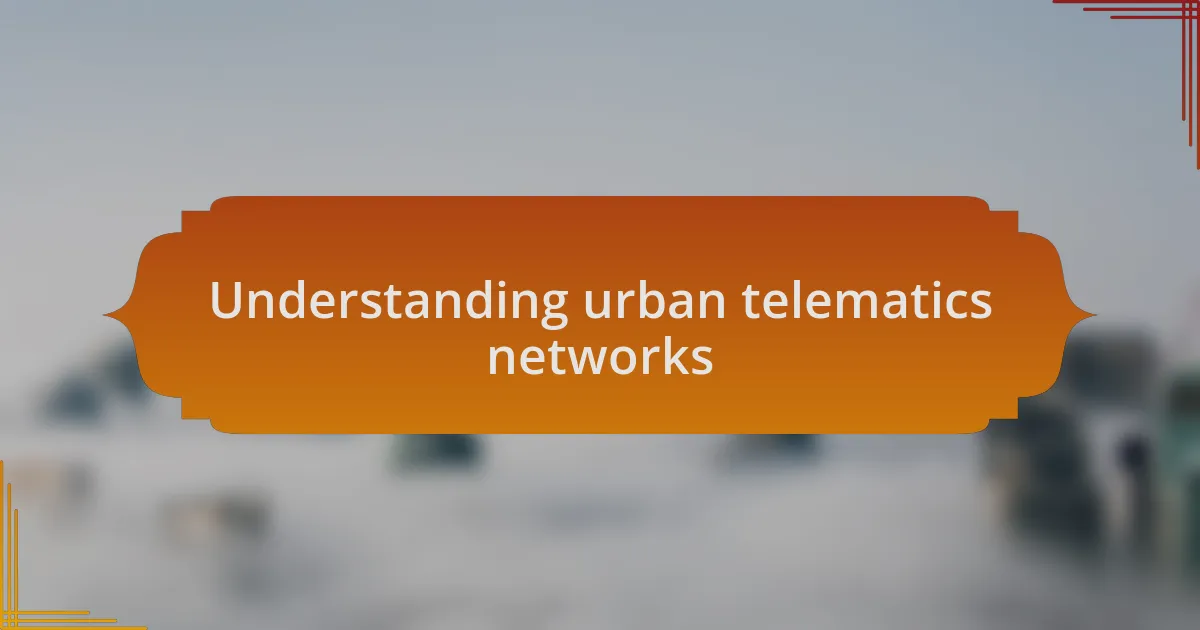
Understanding urban telematics networks
Urban telematics networks are systems that involve the collection and analysis of data related to transportation and mobility within a city. I remember the first time I realized the power of these networks; I was stuck in traffic and saw real-time data on my app indicating alternative routes. This made me think—how could we harness such insights to create a more sustainable urban environment?
Imagine walking through your city and knowing exactly when the next bus will arrive or which bike lanes are less crowded. Urban telematics enables that level of connectivity. It uses sensors, GPS, and communication technologies to provide real-time information, which can dramatically influence our daily choices about how we get around.
Reflecting on this, I often wonder how many people truly appreciate the impact of these networks. They don’t just facilitate smoother commutes; they encourage a shift towards more eco-friendly transportation options. By understanding and utilizing urban telematics, we can collectively move towards a city that prioritizes sustainability while enhancing our quality of life.
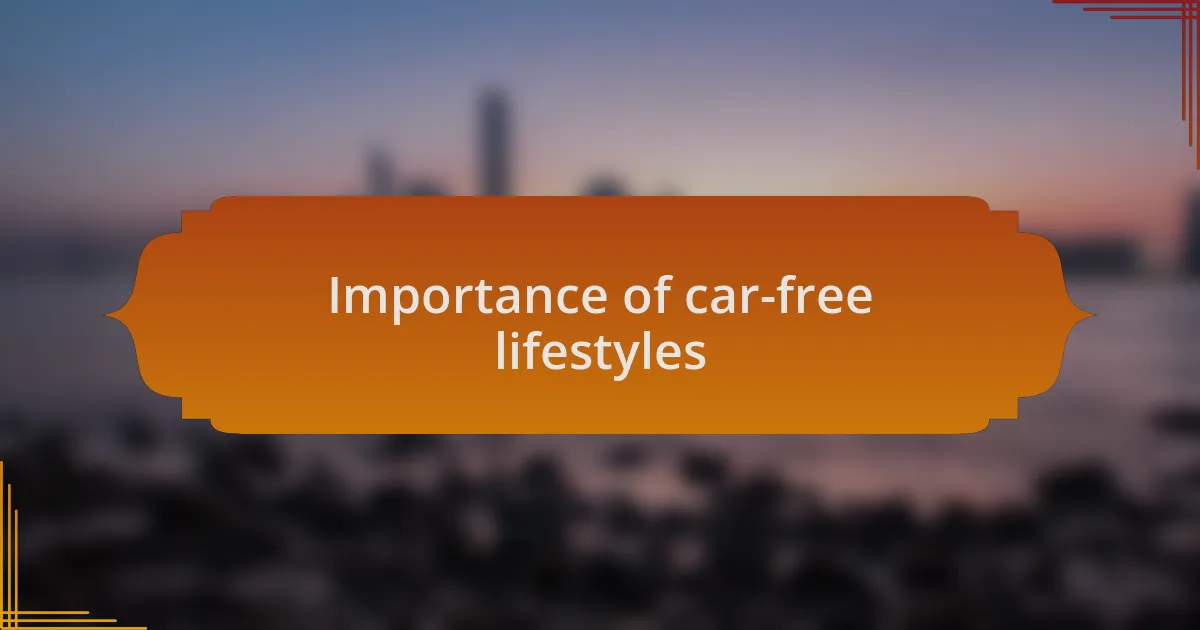
Importance of car-free lifestyles
Embracing a car-free lifestyle opens the door to a more vibrant urban experience. When I first decided to ditch my car, I was surprised by how much more I noticed on my daily walks. The sounds of the city, the scent of fresh coffee wafting from local cafes—these little moments added a layer of richness to my life that I had overlooked while speeding by in my vehicle.
Moreover, living without a car fosters a sense of community. I recall one sunny afternoon, I stumbled upon a neighborhood market while biking. I struck up conversations with vendors and other shoppers, creating connections I never would have made from behind a windshield. This sense of belonging enhances my social life and encourages a spirit of collaboration among residents in a shared space.
On a broader scale, the importance of car-free lifestyles cannot be overstated. They significantly reduce traffic congestion and air pollution, leading to healthier cities. Isn’t it time we prioritize our well-being and the planet? A world with less reliance on cars beckons us to explore alternatives, creating a more sustainable, connected, and thriving urban environment.
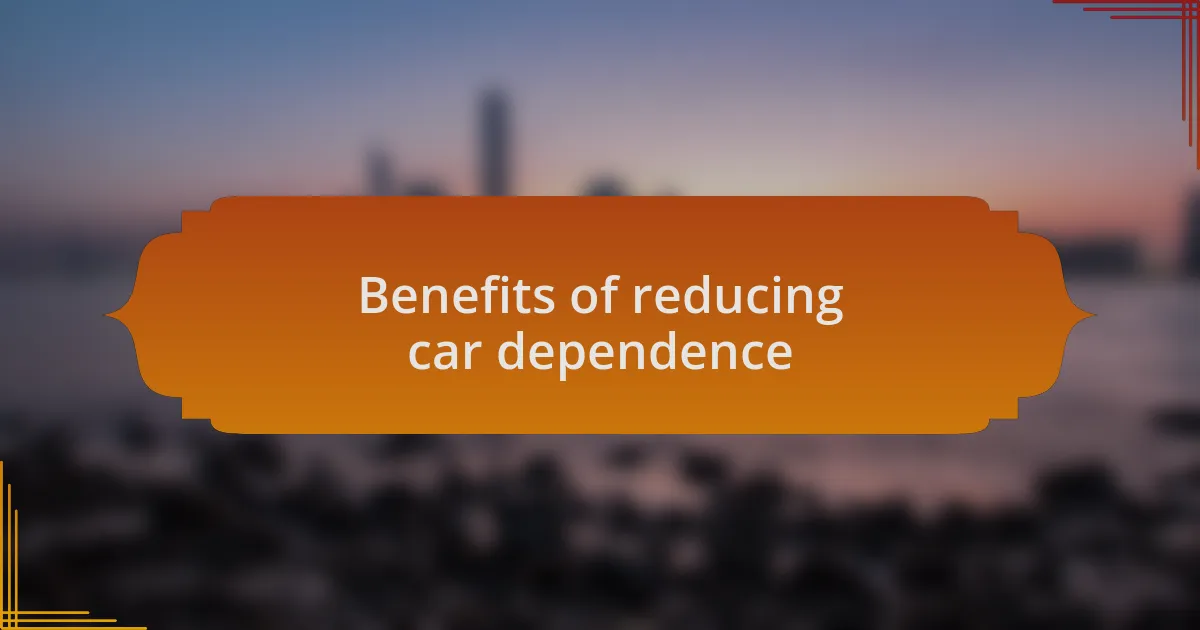
Benefits of reducing car dependence
Reducing car dependence yields remarkable financial savings. I remember calculating my monthly expenses and was shocked to see how much I spent on gas, insurance, and maintenance. Once I transitioned to biking and public transport, my budget felt lighter, and I could redirect those funds towards experiences, like enjoying a weekend getaway or investing in my hobbies.
There’s also a profound improvement in mental well-being that comes with walking or cycling instead of driving. Just last week, I took a leisurely walk to a nearby park instead of driving. The simple act of feeling the fresh air on my face revitalized my spirit and cleared my mind. Have you ever noticed how much more alive you feel when you’re engaged with your surroundings?
Finally, a decrease in car usage significantly contributes to environmental health. It’s empowering to know that by opting out of the car culture, I’m helping reduce greenhouse gas emissions. Each small change in our travel habits combines to create a larger impact that fosters a better future for our cities and planet.
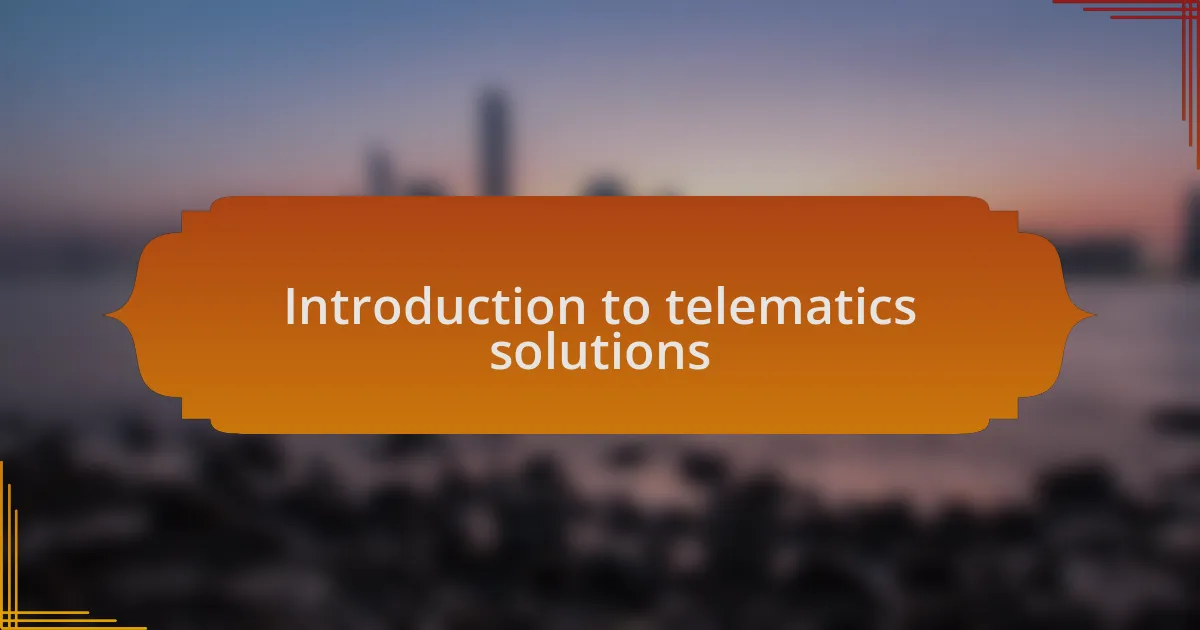
Introduction to telematics solutions
Telematics solutions encompass the integration of telecommunications and monitoring systems that provide real-time data to improve vehicle management and urban mobility. In my experience with various apps and services, I’ve found that these systems can transform how we navigate our cities. They not only track vehicle performance but also analyze traffic patterns and optimize route planning. Have you ever wondered how much time you could save by avoiding congested routes?
One key benefit of telematics is its ability to gather detailed insights about transportation habits, which has been invaluable in my journey towards a car-free lifestyle. By monitoring travel data, I realized I could swap unnecessary trips for more sustainable options like biking or using public transport. This shift didn’t just ease my daily commute; it also sparked a newfound appreciation for the neighborhoods I traversed. It’s fascinating to think about how data can encourage a more connected, community-oriented way of living.
As cities adapt to embrace these smart technologies, the potential for enhanced urban planning becomes clear. For instance, telematics can inform infrastructure improvements, leading to dedicated bike lanes or more efficient bus routes. I remember feeling a sense of hope when my local community implemented real-time tracking for public transport. It not only made commuting more efficient but also reignited my excitement for exploring the city without a car. Isn’t it thrilling to imagine a future where technology and sustainability work hand-in-hand?
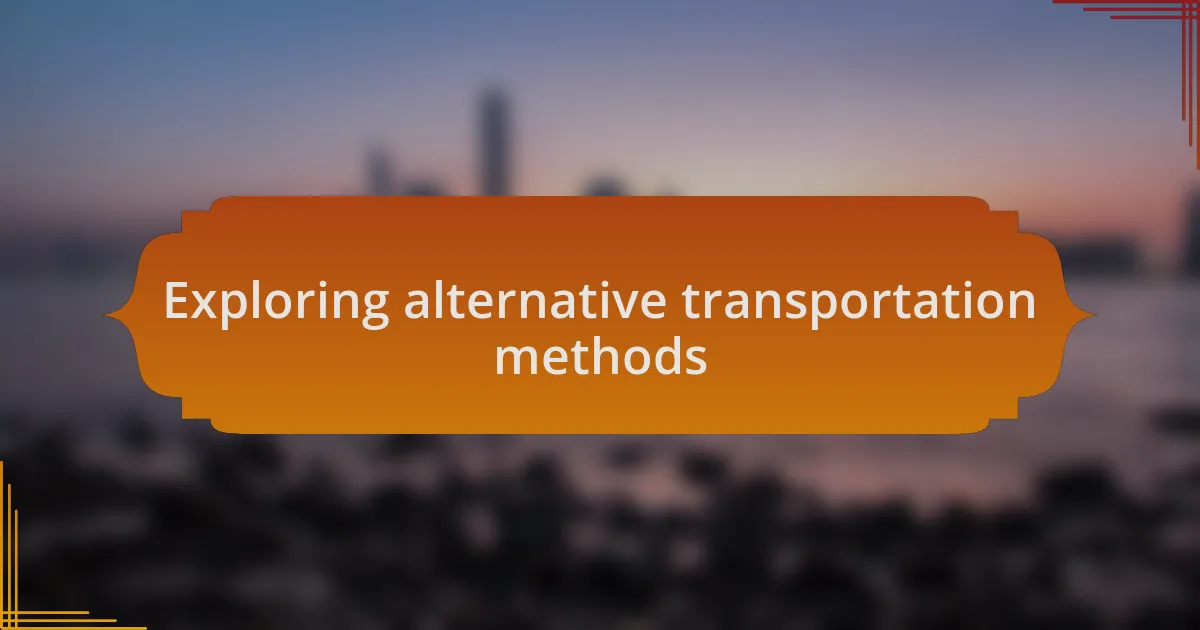
Exploring alternative transportation methods
When I first started exploring alternative transportation options, I was pleasantly surprised by how accessible they were. Tapping into bike-sharing programs in my city opened up a whole new world for me. I remember the first time I hopped on a bike; the exhilaration of feeling the wind on my face made me realize how liberating it can be to travel on two wheels instead of four.
Public transport also brought significant changes to my daily routine. Initially, I was hesitant about timing and reliability, but after a few weeks of using it diligently, I discovered that the bus could be a cozy space for reading or catching up on podcasts. Have you ever taken a moment to enjoy the journey instead of just focusing on the destination? It quickly turned into a cherished part of my day, and I embraced the unpredictability as an opportunity for reflection.
Walking has become my go-to method for shorter trips, and it’s astonishing how much I’ve learned about my neighborhood—a stark contrast to the limited view from the driver’s seat. Each stroll is an adventure, unveiling hidden cafés and park spaces I never knew existed. Isn’t it incredible how these small shifts in how we travel can lead to a broader understanding of our surroundings?
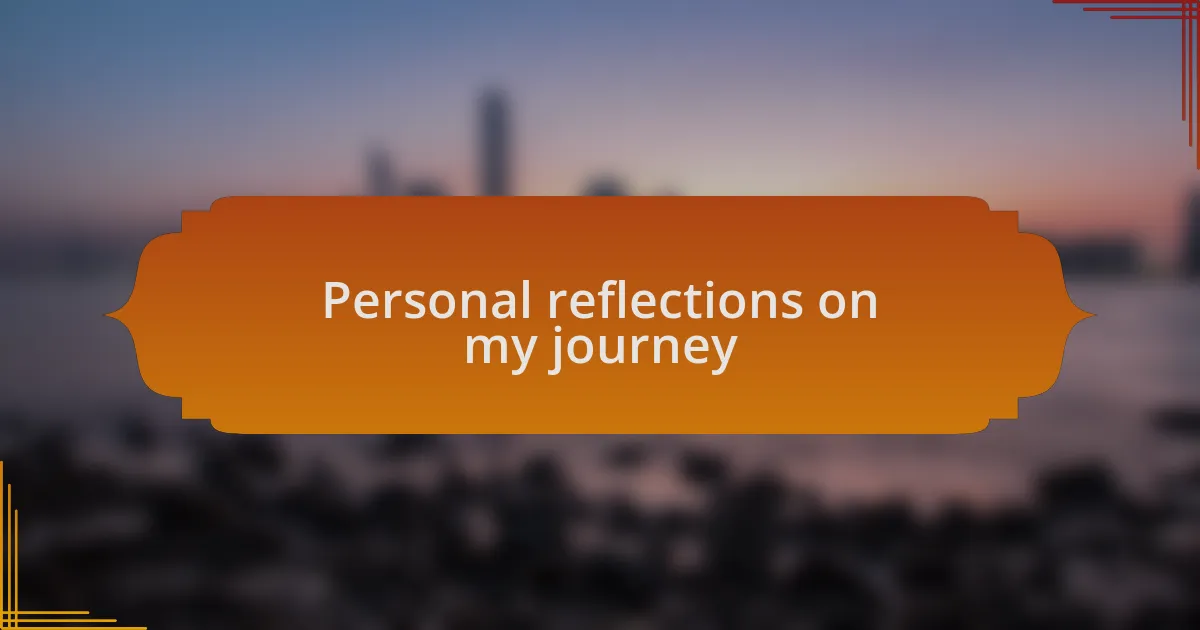
Personal reflections on my journey
As I reflect on my journey towards a car-free lifestyle, the sense of freedom I felt during my first long-distance walk stands out. It was a chilly Saturday morning when I decided to trek to a local farmers’ market, and I vividly remember the brisk air filling my lungs and the thrill of setting my own pace. This simple act, usually taken for granted, became a moment of connection with my community, and I felt truly engaged with the world around me.
Switching to biking for my daily commute has been a game-changer. One afternoon, I took a route I had never tried, pedaling along tree-lined streets and discovering a quaint, hidden garden. That day, an impromptu picnic with my partner in that beautiful space shifted my perspective on what it means to live actively—have you ever stumbled upon a moment that redefined your usual routine? It’s these delightful surprises that keep me motivated to ditch the car and embrace a more adventurous way of navigating my city.
Looking back, I realize how much my mindset has evolved. In the beginning, I often struggled with the inconvenience of not having a car, grappling with feelings of frustration and impatience. However, over time, that resistance transitioned into a deeper appreciation for the rhythm of urban life. Each step, each pedal stroke, feels like an intentional choice, connecting me not just to my destination, but to the vibrant energy that surrounds me. Isn’t it fascinating how embracing a simple shift can influence our overall happiness?